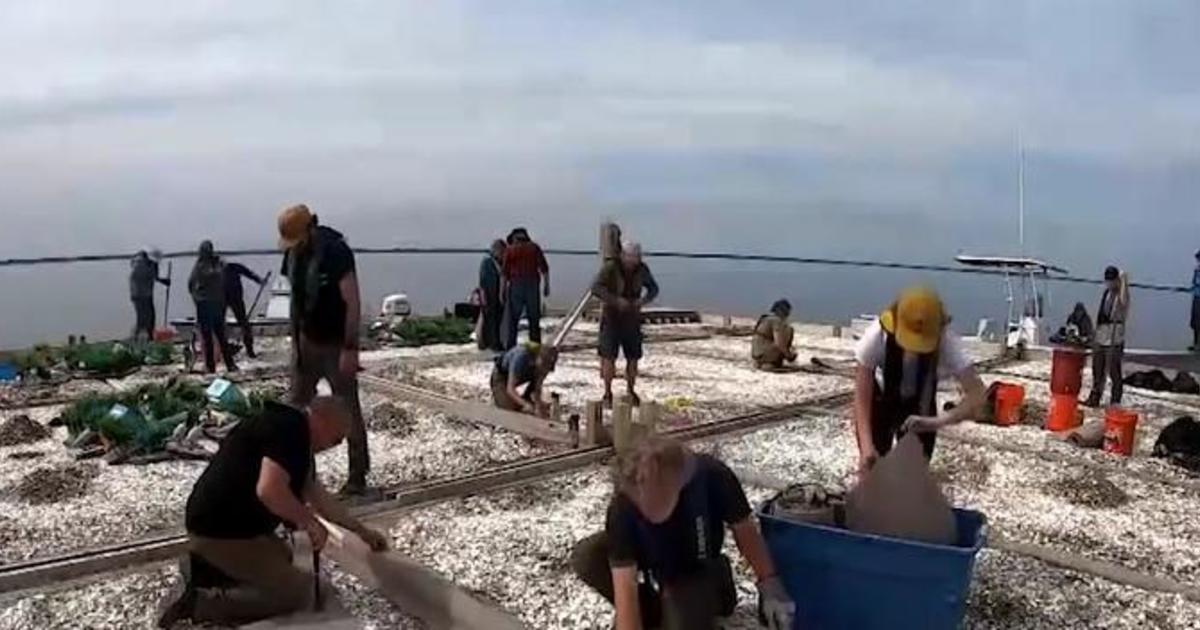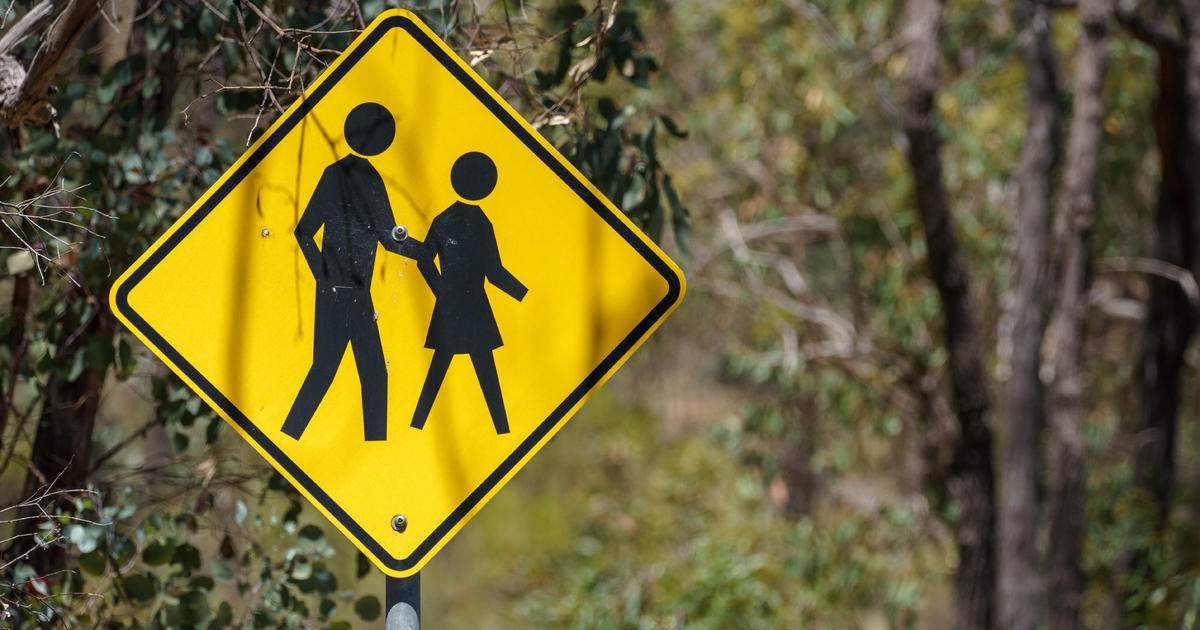Man Finds Peace Cleaning Tombstones On Delmarva
By BRICE STUMP
The Daily Times of Salisbury
EASTON, Md. (AP) -- Being in a graveyard might be uncomfortable for some people, but others, such as Eric Drummer, delight in the experiences to be found among marble and granite tombstones, gnarly trees and messages in stone.
An outing to a cemetery has Drummer carrying a handful of plastic brushes in a bucket, a wooden spatula, tongue depressor, some spray bottles and water. His chore today is to find a particular stone and clean it. He is making a business fighting lichen, moss and dirt on tombstones.
"In 2005, after my father died, my mother gave me a little brown bag and everything in it was what my father had found about our family genealogy. That got me to wanting to know more. I wanted to know where my great-grandfather was buried and started searching cemeteries," Drummer said. "When I found family stones, they were often covered with dead grass, dirty because no one had been there for years. So I started taking things with me to clean them up so I could take good photographs of them. I said to myself, `I bet I'm not the only one finding family stones that are in need of cleaning.' I thought cleaning tombstone and providing other gravesite care could be a service, something that could benefit other people. I knew there were folks who were unable to visit a graveyard and clean stones because of an age or health or location."
Several months ago the construction manager and consultant outfitted a pickup truck as "Drummer's Gravesite Care," picked up necessary gear and became what might be the Shore's first professional tombstone cleaner who also offers gravesite maintenance services.
"We make scheduled flower deliveries, remove debris and place holiday or anniversary items at the grave for families throughout the year," he said. "The only thing `perpetual care' means is grass cutting. I have been to graveyards and seen flat stones (ledgers) covered with so much grass there was only a small hole in the center of the grass where you could see part of the stone. We would clean that stone and keep grass from covering it in the future."
How do you go about cleaning tombstones?
Drummer, 53, found information through the National Center for Preservation Technology and Training's materials conservation program. They key to success, he discovered, is to do no harm.
"I have seen stones where people have tried to read the lettering and have used wire brushes on them. That process has permanently scarred and marred that stone. You don't want metal on stone," he said. "I use plastic brushes and wood because they don't hurt the stone. Home detergents, especially shaving creams and bleach, are not safe. They only thing you should use is plain water. What some well-intentioned people are doing, God bless 'em, can harm the stone in the long run. I use a biocide cleaner, a natural cleaner, that goes after the growth and does not harm the stone."
Once cleaned, the shadow, or ghost, of the removed growth that remains on the stone is removed by the sun.
"The sun is the safest `bleach,' a real powerhouse," said Samuel "S.J." Disharoon, tombstone dealer of Salisbury Monument. "You have to get the growth and pollutants off the stone, and if sunlight can get to the stone, it will absolutely brightened it up over time."
Surprisingly, the best way to protect a tombstone is to bury it.
"When they are in the ground, they are protected from weathering, moss, lichen and pollutants. Many times I have found century-old tombstones in the ground and when they were uncovered, they looked as fresh and sharp as they day they were carved," Disharoon said.
From a 65-gallon water tank in his truck, Drummer fills a portable 15-gallon plastic tank on wheels that he had outfitted with a handle. Because a cleaning project might be a 100 feet or more from the road, Drummer has to pull the tank through the graveyard, between stones and around trees.
"I also take a 12-volt battery with me that powers the sprayer, which doesn't develop more pressure than you'd get from a garden house," he said. "You don't want to pressure wash a stone."
Water under high pressure will remove dirt and growth, but it also cuts and eats its way into stone, especially marble.
"Not only can you gauge a stone before you realize what you're doing, but if there are certain letters, like an O or a P, you can blow the center of the letters away, because that is the weakest part of the lettering," he said.
Worse, hand-carved elements of a marble tombstones like flowers, vines and images can be smoothed, or erased, as high pressure water cuts away stone.
Drummer needs the 15 gallons to keep the tombstone wet. That makes removal of grime and growth easier.
"You soak it with water and scrub, soak with water and scrub until the surface is clean," he said.
Typically, it is moss and lichens of all textures and colors usually found on tombstones. Heavy, black mold growth that builds up over time is especially stubborn to remove. Some tombstones have a growth buildup of almost an eighth of an inch thick, he said.
Drummer said he is an outdoors kind of guy, and being in a graveyard offers more than just being outdoors.
"There is a peacefulness out there," he said. "It's not `spooky.' I'm all alone. I like being on my own, working alone, and these stones are interesting to work on."
Drummer strives to keep the peace in the graveyard.
All of his equipment is battery powered to insure that peace and quiet of a graveyard is maintained. "The way I look at this, is that when I'm cleaning a stone, it's visual memorable to that family's loved one. I work with respect, knowing that. That's how I got started, going out and cleaning my families tombstones. I treat everybody's like I'm treating my own. When people come to the cemetery to visit, I did not want disturb their time. I want to respect that," he said. "I want to be a quiet presence. I don't want to generate any noise in the graveyard."
During the summer he gets up at 5 a.m. to beat the mid-day heat. Warm stones, he found, dry faster than he would like after he waters them down to soften surface growth. Toothbrush-size brushes are used to work the lettering recesses. There is a slight crunching, gnawing sound as wooden tools twist and turn in tough quarters, in the center of a flowers, or the face of an angel. There's also the scrubbing sound of stiff plastic against stone.
At 6-foot 1-inch, and 300 pounds, he sometimes has to get own on his knees to work on short stones.
"It helps when you can buy scrub brushes with long handles," he said, smiling.
One small stone held special interest for the cleaner. Drummer has a strong interest in Civil War history. In an Easton cemetery, he found the stone of J. H. Hunt, a modest, thin, vertical stone about 12 inches tall.
"There's a lot more, but it's underground," Drummer said, pointing to the inscription that disappeared into the grass and dirt.
"This is the tombstone of a 16-year-old boy who was with the 149th Regiment, Ohio National Guard unit. They were referred to as the `100-daysmen' because they were called up for 100 days of service. I looked up the information about this young man and found out, from his company roster, that he marched here to Easton to be part of the home guard that was protecting the Eastern Shore from Confederate invasion and activity. He fell ill and died here at age 16," Drummer said. "His regiment was called up, marched to near Frederick, Md., and fought in the Battle of Monocacy. Someone bought his grave plot and someone else bought this headstone, maybe the men who served in his regiment."
Drummer has offered to clean the Civil War tombstones for free. That's because this is more of a labor of love than a simple business venture.
"I have had people come up to me and tell me this business concept is a unique idea, and others are asking me if it is spooky to be in a place of death. It doesn't bother me. Some of the most unique carvings you can find are on tombstones. I really enjoy finding examples of this kind of great artwork," he said.
As with everything in life, nothing is permanent.
A good cleaning helps protect a stone, but eventually it will require more cleanings over the years. "A cleaning can last two years. If a stone is simply washed periodically, that will keep new growth from returning," he said.
Drummer can reached at 410-310-3235 and through his website, www.drummersgravesitecare.com.
(Copyright 2012 by The Associated Press. All Rights Reserved.)



